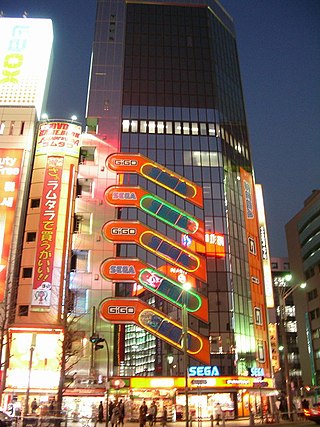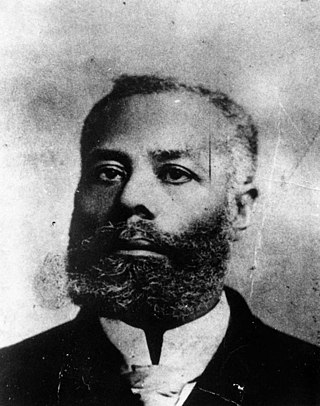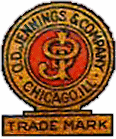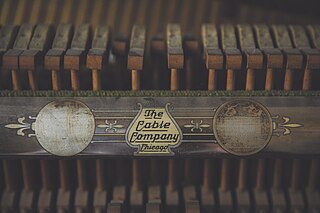
An amusement arcade, also known as a video arcade, amusements, arcade, or penny arcade, is a venue where people play arcade games, including arcade video games, pinball machines, electro-mechanical games, redemption games, merchandisers, or coin-operated billiards or air hockey tables. In some countries, some types of arcades are also legally permitted to provide gambling machines such as slot machines or pachinko machines. Games are usually housed in cabinets.

Elijah J. McCoy was a Canadian-American engineer of African-American descent who invented lubrication systems for steam engines. Born free on the Ontario shore of Lake Erie to parents who fled enslavement in Kentucky, he traveled to the United States as a young child when his family returned in 1847, becoming a U.S. resident and citizen. His inventions and accomplishments were honored in 2012 when the United States Patent and Trademark Office named its first regional office, in Detroit, Michigan, the "Elijah J. McCoy Midwest Regional Patent Office".

The United States Patent and Trademark Office (USPTO) is an agency in the U.S. Department of Commerce that serves as the national patent office and trademark registration authority for the United States. The USPTO's headquarters are in Alexandria, Virginia, after a 2005 move from the Crystal City area of neighboring Arlington, Virginia.

Atari Games Corporation, known as Midway Games West Inc. after 1999, was an American producer of arcade games. It was formed in 1985 when the coin-operated arcade game division of Atari, Inc. was transferred by Warner Communications to a joint venture with Namco. It was one of several successor companies to use the name Atari. The company developed and published games for arcades and across consumer gaming consoles such as the Commodore 16, Commodore 64, Game Boy, Nintendo Entertainment System (NES) and other platforms using the Tengen label. Some of the games Atari had developed include Tetris, Road Runner, RoadBlasters and Primal Rage. After Time Warner reassumed full ownership in 1994, the company was sold to WMS Industries in 1996, and became part of Midway Games when that company was spun-off by WMS in 1998. It ceased operations in 2003 and its former assets were sold back to Warner Bros. Interactive Entertainment in 2009 following Midway's bankruptcy.

Irem Software Engineering is a Japanese video game console developer and publisher, and formerly a developer and manufacturer of arcade games as well. The company has its headquarters in Chiyoda, Tokyo.

Albert Kahn was an American industrial architect. He was accredited the architect of Detroit and designed industrial plant complexes such as the Ford River Rouge automobile complex. He designed the construction of Detroit skyscrapers and office buildings as well as mansions in the city suburbs. He led an organization of hundreds of architect associates and in 1937, designed 19% of all architect-designed industrial factories in the United States. Under a unique contract in 1929, Kahn established a design and training office in Moscow, sending twenty-five staff there to train Soviet architects and engineers, and to design hundreds of industrial buildings under their first five-year plan. They trained more than 4,000 architects and engineers using Kahn's concepts. In 1943, the Franklin Institute posthumously awarded Kahn the Frank P. Brown Medal.

The Mutoscope is an early motion picture device, invented by W. K. L. Dickson and Herman Casler and later patented by Herman Casler on November 21, 1894. Like Thomas Edison's Kinetoscope, it did not project on a screen and provided viewing to only one person at a time. Cheaper and simpler than the Kinetoscope, the system, marketed by the American Mutoscope Company, quickly dominated the coin-in-the-slot peep-show business.
Midway Games Inc., known previously as Midway Manufacturing and Bally Midway, and commonly known as simply Midway, was an American video game developer and publisher. Midway's franchises included Mortal Kombat, Rampage, Spy Hunter, NBA Jam, Cruis'n, and NFL Blitz. Midway also acquired the rights to video games that were originally developed by Williams Electronics and Atari Games, such as Defender, Joust, Robotron 2084, Gauntlet, and the Rush series.

WMS Industries, Inc. was an American electronic gaming and amusement manufacturer in Enterprise, Nevada. It was merged into Scientific Games in 2016. WMS's predecessor was the Williams Manufacturing Company, founded in 1943 by Harry E. Williams. However, the company that became WMS Industries was formally founded in 1974 as Williams Electronics, Inc.

The Graphophone was the name and trademark of an improved version of the phonograph. It was invented at the Volta Laboratory established by Alexander Graham Bell in Washington, D.C., United States.
Gremlin Industries was an American arcade game manufacturer active from 1971 to 1983, based in San Diego, California. Following its acquisition by Sega in 1978, the company was known as Gremlin/Sega or Sega/Gremlin. Sega/Gremlin's notable franchise is Head On. The company's name was subsequently changed to Sega Electronics in 1982, before it closed in 1983. Sega later released emulated and playable version of some of Sega/Gremlin games as vault material for the Sega Ages and Sega Genesis Collection series.
The Mills Novelty Company, Incorporated of Chicago was once a leading manufacturer of coin-operated machines, including slot machines, vending machines, and jukeboxes, in the United States. Between about 1905 and 1930, the company's products included the Mills Violano-Virtuoso and its predecessors, celebrated machines that automatically played a violin and, after about 1909, a piano. By 1944, the name of the company had changed to Mills Industries, Incorporated. The slot machine division was then owned by Bell-O-Matic Corporation. By the late 1930s, vending machines were being installed by Mills Automatic Merchandising Corporation of New York.

Jennings & Company was a leading manufacturer of slot machines in the United States and also manufactured other coin-operated machines, including pinball machines, from 1906 to the 1980s. It was founded by Ode D. Jennings as Industry Novelty Company, Incorporated of Chicago. On the death of its founder in 1953, the company was succeeded by Jennings & Company.
The Bundy Manufacturing Company was a 19th-century American manufacturer of timekeeping devices that went through a series of mergers, eventually becoming part of International Business Machines and Simplex Time Recorder Company. It was the first time-recording company in the world to produce time clocks, colloquially known as 'Bundys'. The company was founded by the Bundy Brothers.

The New Amsterdam Historic District is a historic district located in Detroit, Michigan. Buildings in this district are on or near three sequential east-west streets on the two blocks between Woodward Avenue and Second Avenue. It was listed on the National Register of Historic Places in 2001.
Nelsonic Industries is an American electronics manufacturing and development company that operated from Long Island City, Queens, New York City in the early 1980s and throughout the 1990s when it was acquired by the watch-manufacturer, M.Z. Berger. Nelsonic produced numerous toy-themed wristwatches, often targeting younger audiences with likenesses of characters from popular franchises such as Barbie, the Ghostbusters, and Mario. Nelsonic became notable during the early mid-1980s for being the first electronics company in the United States to produce game-watches. For a period subsequent to its purchase by M.Z. Berger, Nelsonic operated as a subsidiary division of its parent company and game-watches were produced that bore the Nelsonic mark. This practice ended as M.Z. Berger shifted focus to more traditional and higher-end timepieces. Today the original Nelsonic Game Watch line has entered the secondary market and individual Game Watches have become highly sought-after collectibles that often fetch high prices on eBay and other online auction websites.

The Cable Company was an American manufacturer and distributor of pianos and reed organs that operated independently from 1880 to 1936.

Trade stimulators were countertop machines widely used to encourage shoppers to indulge in a game of chance. They became popular in American saloons during the 1880s, their use spreading to cigar, confectionery and general stores. Produced in a wide range of designs, they were developed during the same era as slot machines and were operated by inserting a coin and pulling a lever, the player standing to win prizes of cigars, cigarettes, candy and other goods if a winning combination came up. During periods when gambling was prohibited or in states where gambling was illegal, these machines could be used with little fear of prosecution.
The North Brothers Manufacturing Company, was an American manufacturer based in Philadelphia, Pennsylvania that specialized in the making of hand tools, small appliances and some specialized power tools. They were family owned and operated for over 60 years before being acquired by the Stanley Works in 1946. They are probably most well known for their line of tools, particularly the "Yankee" brand of ratcheting screwdrivers.














